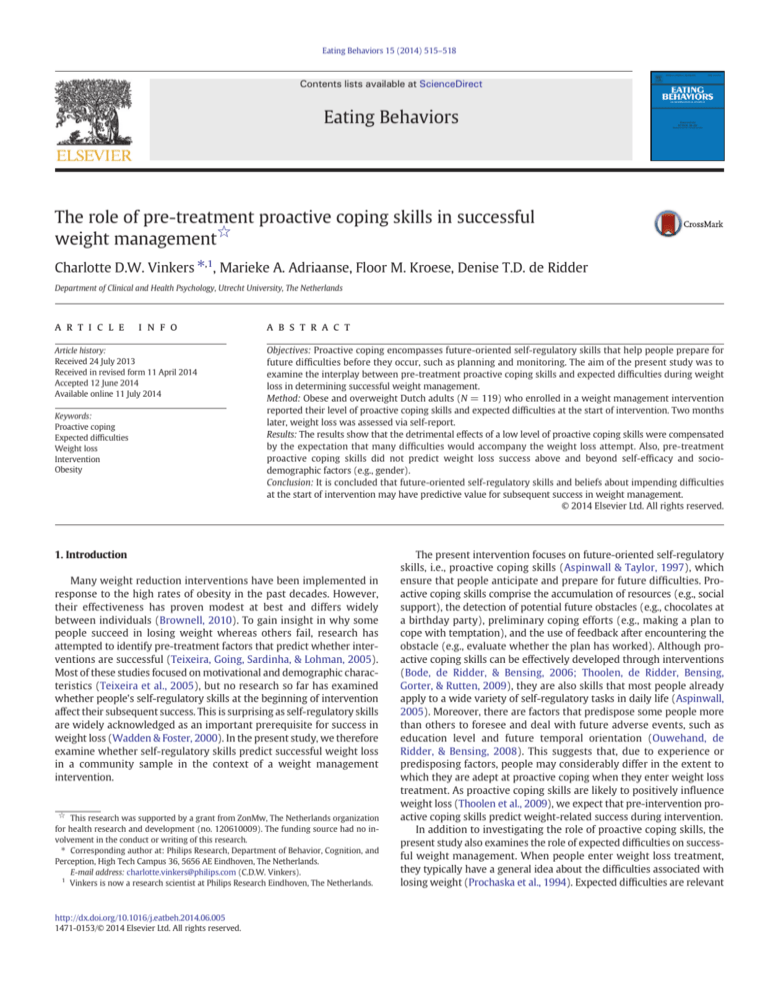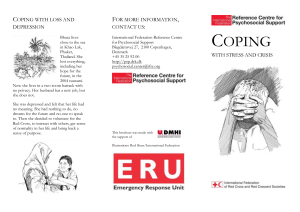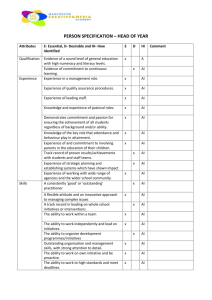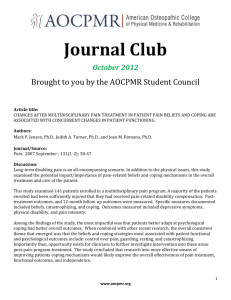
Eating Behaviors 15 (2014) 515–518
Contents lists available at ScienceDirect
Eating Behaviors
The role of pre-treatment proactive coping skills in successful
weight management☆
Charlotte D.W. Vinkers ⁎,1, Marieke A. Adriaanse, Floor M. Kroese, Denise T.D. de Ridder
Department of Clinical and Health Psychology, Utrecht University, The Netherlands
a r t i c l e
i n f o
Article history:
Received 24 July 2013
Received in revised form 11 April 2014
Accepted 12 June 2014
Available online 11 July 2014
Keywords:
Proactive coping
Expected difficulties
Weight loss
Intervention
Obesity
a b s t r a c t
Objectives: Proactive coping encompasses future-oriented self-regulatory skills that help people prepare for
future difficulties before they occur, such as planning and monitoring. The aim of the present study was to
examine the interplay between pre-treatment proactive coping skills and expected difficulties during weight
loss in determining successful weight management.
Method: Obese and overweight Dutch adults (N = 119) who enrolled in a weight management intervention
reported their level of proactive coping skills and expected difficulties at the start of intervention. Two months
later, weight loss was assessed via self-report.
Results: The results show that the detrimental effects of a low level of proactive coping skills were compensated
by the expectation that many difficulties would accompany the weight loss attempt. Also, pre-treatment
proactive coping skills did not predict weight loss success above and beyond self-efficacy and sociodemographic factors (e.g., gender).
Conclusion: It is concluded that future-oriented self-regulatory skills and beliefs about impending difficulties
at the start of intervention may have predictive value for subsequent success in weight management.
© 2014 Elsevier Ltd. All rights reserved.
1. Introduction
Many weight reduction interventions have been implemented in
response to the high rates of obesity in the past decades. However,
their effectiveness has proven modest at best and differs widely
between individuals (Brownell, 2010). To gain insight in why some
people succeed in losing weight whereas others fail, research has
attempted to identify pre-treatment factors that predict whether interventions are successful (Teixeira, Going, Sardinha, & Lohman, 2005).
Most of these studies focused on motivational and demographic characteristics (Teixeira et al., 2005), but no research so far has examined
whether people's self-regulatory skills at the beginning of intervention
affect their subsequent success. This is surprising as self-regulatory skills
are widely acknowledged as an important prerequisite for success in
weight loss (Wadden & Foster, 2000). In the present study, we therefore
examine whether self-regulatory skills predict successful weight loss
in a community sample in the context of a weight management
intervention.
☆ This research was supported by a grant from ZonMw, The Netherlands organization
for health research and development (no. 120610009). The funding source had no involvement in the conduct or writing of this research.
⁎ Corresponding author at: Philips Research, Department of Behavior, Cognition, and
Perception, High Tech Campus 36, 5656 AE Eindhoven, The Netherlands.
E-mail address: charlotte.vinkers@philips.com (C.D.W. Vinkers).
1
Vinkers is now a research scientist at Philips Research Eindhoven, The Netherlands.
http://dx.doi.org/10.1016/j.eatbeh.2014.06.005
1471-0153/© 2014 Elsevier Ltd. All rights reserved.
The present intervention focuses on future-oriented self-regulatory
skills, i.e., proactive coping skills (Aspinwall & Taylor, 1997), which
ensure that people anticipate and prepare for future difficulties. Proactive coping skills comprise the accumulation of resources (e.g., social
support), the detection of potential future obstacles (e.g., chocolates at
a birthday party), preliminary coping efforts (e.g., making a plan to
cope with temptation), and the use of feedback after encountering the
obstacle (e.g., evaluate whether the plan has worked). Although proactive coping skills can be effectively developed through interventions
(Bode, de Ridder, & Bensing, 2006; Thoolen, de Ridder, Bensing,
Gorter, & Rutten, 2009), they are also skills that most people already
apply to a wide variety of self-regulatory tasks in daily life (Aspinwall,
2005). Moreover, there are factors that predispose some people more
than others to foresee and deal with future adverse events, such as
education level and future temporal orientation (Ouwehand, de
Ridder, & Bensing, 2008). This suggests that, due to experience or
predisposing factors, people may considerably differ in the extent to
which they are adept at proactive coping when they enter weight loss
treatment. As proactive coping skills are likely to positively influence
weight loss (Thoolen et al., 2009), we expect that pre-intervention proactive coping skills predict weight-related success during intervention.
In addition to investigating the role of proactive coping skills, the
present study also examines the role of expected difficulties on successful weight management. When people enter weight loss treatment,
they typically have a general idea about the difficulties associated with
losing weight (Prochaska et al., 1994). Expected difficulties are relevant
516
C.D.W. Vinkers et al. / Eating Behaviors 15 (2014) 515–518
to examine in conjunction with proactive coping skills because both are
related to the anticipation of obstacles to goal attainment. However, a
crucial difference is that proactive coping entails that people actively
prepare for future difficulties, while expected difficulties do not imply
active preparation. Few studies have directly examined the impact of
expected difficulties on weight loss, of which some have shown that
the expectation of difficulties yields more preparation for future obstacles (Aspinwall, 2005; Oettingen & Wadden, 1991; Polivy & Herman,
2002), suggesting that expecting difficulties is beneficial to weight management. However, other studies have shown that expected difficulties
may elicit discouragement (Clark, Pera, Goldstein, Thebarge, & Guise,
1996; Prochaska et al., 1994), which implies that it may be detrimental
to expect many difficulties during a weight loss attempt. Based on this
inconsistency in the literature we have no reason to expect that either
many or few expected difficulties are beneficial to success in weight
management and therefore we examine this issue in an exploratory
fashion. However, we propose that the effect of expected difficulties,
whether beneficial or detrimental, is only likely to occur at a low level
of pre-treatment proactive coping skills since proactive coping may
prepare people for difficulties during weight loss regardless of their
expectations of such difficulties.
2. Method
2.1. Participants
Of the 185 participants who were allocated to the intervention, 66
were excluded from analyses: 31 did not return their baseline questionnaire, 31 dropped out and four participants failed to report their weight
after eight weeks of intervention (T1), which is the critical dependent
variable in this paper. Multiple separate ANOVAs and Chi-Square tests
demonstrated that included and excluded participants did not differ
on baseline variables (see Table 1), all ps b .22. The final sample (N =
119), consisting of 58 men and 61 women, had an average age of
55.92 years (SD = 5.77), and an average BMI of 29.00 (SD = 2.00;
69.7% overweight vs. 30.3% obese (BMI N 30).
Table 1
Results from hierarchical multiple regression analyses with weight change (T1 − T0) as
outcome measure.
ΔR2
β
Step 1
Gender (0 = male, 1 = female)
Education level (1 vs. 3)
.27⁎⁎
.17⁎
.16⁎⁎
.11
Education level (2 vs. 3)
−.11
Age
Employment status (0 = not employed, 1 = employed)
Self-efficacy
Step 2
−.26⁎⁎
−.10
.21⁎
Baseline BMI
Step 3
.04⁎
2.2. Procedure
As the procedure of the intervention is reported elsewhere (Vinkers,
Adriaanse, Kroese, & de Ridder, 2014), we provide a brief description
of the initial phase of eight weeks of the intervention. This phase
entailed three sessions during which participants were taught proactive
coping skills in weight management by a) realistic dietary goal setting;
b) exploring barriers to goal attainment; c) appraisal of barriers to
goal attainment; d) making specific plans for goal attainment; and
e) evaluating progress. Measures relevant to the current study aims
were employed at baseline (T0) and immediately after the initial
phase (T1). Full details of the trial protocol can be found at www.
trialregister.nl, trial number 2791.
2.3. Measures
2.3.1. Control variables
Gender, age, education level, and employment status were included
as demographic variables. As self-efficacy has been identified as pretreatment predictor for weight loss (Stubbs et al., 2011), we assessed
self-efficacy at baseline by 6 items tapping participants' confidence in
successfully self-managing a healthy diet with scores ranging from 1
(not at all) to 7 (completely); α = .80.
2.3.2. Proactive coping skills
Proactive coping skills were measured with the Utrecht Proactive
Coping Competence scale (Bode, Thoolen, & de Ridder, 2008), a 21item questionnaire. Participants were instructed to rate the extent to
which they had proactive coping skills in the context of weightmanagement. All items (example: “Making realistic plans”) were
measured on 4-point scales, ranging from 1 (not competent) to 4 (very
competent); α = .87.
2.3.3. Expected difficulties
Expected difficulties were measured by one item: “To which extent
do you expect difficulties with maintaining weight loss in the long
term?”, ranging from 1 (no difficulties at all) to 7 (many difficulties).
2.3.4. BMI and weight loss
Participants reported their height and weight at T0 and T1. Baseline
BMI was calculated (weight in kg / (height in m2)) and weight change
was calculated by subtracting T0 from T1 values.
2.4. Strategy of analysis
Analyses were run for the main dependent variable, weight change
during the initial phase of the intervention. Prior to analyses, all predictor variables were centered and a two-way interaction term was
calculated for proactive coping skills and expected difficulties (Aiken &
West, 1991). We employed hierarchical regression analysis with age,
gender, employment status, education level and baseline self-efficacy
entered in Step 1. In Step 2, baseline self-reported BMI was entered. In
Step 3, proactive coping skills and expected difficulties were entered,
and in Step 4 the interaction term was included.
.01
−.13
Expected difficulties (ED)
3. Results
−.05
Proactive coping skills (PC)
Step 4
Interaction ED ∗ PC
Model R2
.24⁎⁎
2
.04⁎⁎
.25⁎⁎
Beta is based on the final model, ΔR indicates the change in predicted variance with each
new step.
⁎ p b .05.
⁎⁎ p b .01.
3.1. Descriptive statistics
Most participants were employed (68.9%), and completed high/
vocational education or higher education (98.4%). Participants had a
moderate level of self-efficacy (M = 4.64, SD = .93), moderate proactive coping skills (M = 2.82, SD = .37) and expected some difficulties
towards weight loss in the long-term (M = 4.98, SD = 1.25).
C.D.W. Vinkers et al. / Eating Behaviors 15 (2014) 515–518
3.2. Main analysis
Step 1 showed that females, higher educated and unemployed participants lost less weight than their male, less educated and employed
counterparts (see Table 1). Baseline self-efficacy and age were not associated with weight change. Step 2 demonstrated that higher BMI predicted less weight loss. Step 3 showed that neither proactive coping
skills nor expected difficulties predicted weight change. Step 4, however, showed that the interaction between proactive coping skills and
expected difficulties was significant. A simple slopes analysis (Fig. 1)
demonstrated that the effect of expected difficulties was not significant
for those with high (+1SD) proactive coping skills, p = .42. For those
with low (−1SD) proactive coping skills, however, more expected difficulties yielded more weight loss, p = .03.
4. Discussion
The aim of the current study was to examine the role of proactive
coping skills in weight management, and its interaction with the expectation of difficulties during a weight management intervention. As expected, findings show that expected difficulties only differentially
affected weight loss when people were relatively unskilled in proactive
coping before the start of treatment. Specifically, the expectation of few
difficulties during the future weight management attempt resulted in
weight gain of 1.5 k, whereas many expected difficulties led to weight
maintenance over the course of two months. These results indicate
that when people lack the skills to proactively foresee and deal with
future difficulties, they are better off expecting many rather than few
difficulties during their weight loss attempt. As an explanation, we propose that the expectation of difficulties may compensate for a lack of
proactive coping skills by evoking preparatory actions. Thus, people
who expected their weight loss goal to be challenged by situations
that would tempt them to (temporarily) give up their goal may have
prepared for them, and consequently, successfully managed to maintain
their weight. It is also possible that the effects of expected difficulties
occurred through motivational mechanisms. Prior research suggests
that people strategically match the force with which they pursue a
517
goal to the motivation and effort needed in light of the goal's difficulty
(Silvia, McCord, & Gendolla, 2010). This suggests that the expectation
of many difficulties may have boosted motivation to ensure successful
weight management despite the presence of these difficulties. Clearly,
more research is needed to uncover the mechanism(s) through which
expected difficulties affect weight management.
Unexpectedly, we failed to find that more pre-treatment proactive
coping skills yielded more success in subsequent weight loss, which
contradicts research showing the beneficial role of proactive coping
skills in successful weight management (Thoolen et al., 2009). It is interesting, however, that when expected difficulties were taken into account, a high level of proactive coping skills at the start of intervention
neither produced weight loss nor weight gain. This may indicate that
proactive coping skills play a more important role in weight gain prevention than in weight loss. That is, the hallmark of proactive coping
is that people prepare for events that threaten successful goal adherence
(Aspinwall & Taylor, 1997), which means that people who engage in
proactive coping are successful in warding off events that would have
otherwise resulted in lapses into unwanted behavior, i.e., that may
have led to weight gain.
Some limitations must be noted. First, we cannot exclude the possibility that the specific treatment that participants underwent may have
played a role in the current findings. Second, we only measured relatively short-term weight loss; further research should examine whether the
pre-treatment factors under investigation would remain predictive of
weight loss over a longer period of time. Third, the effects found in
this study were small, which could be partly due to the large number
of predictors in combination with the relatively small sample size. It
should be noted, however, that the amount of explained variance in
the present study is similar to those of prior studies on pre-treatment
predictors of weight loss (Stubbs et al., 2011).
Notwithstanding these limitations, the present study has several
important implications. First, our research points towards the
importance of broadening the scope of potential pre-treatment
predictors of weight loss. Specifically, people's future-oriented selfregulatory skills and beliefs about impending difficulties during
weight loss should be taken into account when they enter treatment,
as they may influence success during intervention. Second, findings
indicate that optimistic expectations about weight loss, in this case
as manifested by the belief that successful weight management is
relatively obstacle-free, may have detrimental effects on success,
which supports previous findings demonstrating that being (over)
optimistic may not be helpful (Oettingen & Wadden, 1991). This is
an important knowledge as it is widely assumed that when people
enter treatment, they benefit most from thinking about the positive
outcomes rather than the difficulties ahead (Rothman, 2000). Our
results imply that explicitly pointing out that many difficulties will
ensue before intervention, may be more conducive to success than
previously thought.
Role of funding sources
This research was supported by a grant from ZonMw, The Netherlands organization
for health research and development (no. 120610009). The funding source had no
involvement in the study design, collection, analysis or interpretation of the data, writing
the manuscript, or the decision to submit the paper for publication.
Contributors
Vinkers implemented the study, conducted the statistical analyses and literature
searches, and wrote the first draft of the manuscript. Adriaanse, Kroese and De Ridder
contributed significantly to the study design and protocol, and to the writing and
refinement of further drafts of the manuscript. All authors have contributed to and have
approved the final manuscript.
Fig. 1. Weight change from T0 to T1 at high (+1SD) and low (−1SD) values of proactive
coping skills and expected difficulties.
Conflict of interest
The authors declare no conflict of interest.
518
C.D.W. Vinkers et al. / Eating Behaviors 15 (2014) 515–518
References
Aiken, L. S., & West, S. G. (1991). Multiple regression: Testing and interpreting interactions.
Newbury Park, CA: Sage.
Aspinwall, L. G. (2005). The psychology of future-oriented thinking: From achievement to
proactive coping, adaptation, and aging. Motivation and Emotion, 29, 203–235.
Aspinwall, L. G., & Taylor, S. E. (1997). A stitch in time: Self-regulation and proactive coping. Psychological Bulletin, 121, 417–436.
Bode, C., de Ridder, D. T. D., & Bensing, J. M. (2006). Preparing for aging: development, feasibility, and preliminary results of an educational program for midlife and older based
on proactive coping theory. Patient Education Counseling, 61, 272–278.
Bode, C., Thoolen, B., & de Ridder, D. (2008). Measuring proactive coping. Psychometric
characteristics of the Utrecht Proactive Coping Competence scale (UPCC).
Psychologie & Gezondheid, 36, 81–91.
Brownell, K. D. (2010). The humbling experience of treating obesity: Should we persist or
desist? Behaviour Research and Therapy, 48, 717–719.
Clark, M. M., Pera, V., Goldstein, M. G., Thebarge, R. W., & Guise, B. J. (1996). Counseling
strategies for obese patients. American Journal of Preventive Medicine, 12, 266–270.
Oettingen, G., & Wadden, T. A. (1991). Expectation, fantasy and weight loss: Is the impact
of positive thinking always positive? Cognitive Therapy and Research, 15, 167–175.
Ouwehand, C., de Ridder, D. T. D., & Bensing, J. M. (2008). Individual differences in the use
of proactive coping strategies by middle-aged and older adults. Personality and
Individual Differences, 45, 28–33.
Polivy, J., & Herman, C. P. (2002). If at first you don't succeed — False hopes of self-change.
American Psychologist, 111, 677–689.
Prochaska, J. O., Velicer, W. F., Rossi, J. S., Goldstein, M. G., Marcus, B. H., Rakowski, W.,
et al. (1994). Stages of change and decisional balance for 12 problem behaviors.
Health Psychology, 13, 39–46.
Rothman, A. J. (2000). Toward a theory-based analysis of behavioral maintenance. Health
Psychology, 19, 64–69.
Silvia, P. J., McCord, D.M., & Gendolla, G. H. E. (2010). Self-focused attention, performance
expectancies, and the intensity of effort: Do people try harder for harder goals?
Motivation and Emotion, 34, 363–370.
Stubbs, J., Whybrow, S., Teixeira, P. J., Blundell, J., Lawton, C., Westenhoefer, J., et al.
(2011). Problems in identifying predictors and correlates of weight loss and maintenance: Implications for weight control therapies based on behaviour change. Obesity
Reviews, 12, 688–708.
Teixeira, P. J., Going, S. B., Sardinha, L. B., & Lohman, T. G. (2005). A review of psychosocial
pretreatment predictors of weight control. Obesity Reviews, 6, 43–65.
Thoolen, B. J., de Ridder, D., Bensing, J., Gorter, K., & Rutten, G. (2009). Beyond good intentions: The role of proactive coping in achieving sustained behavioural change in the
context of diabetes management. Psychology & Health, 24, 237–254.
Vinkers, C. D. W., Adriaanse, M. A., Kroese, F. M., & de Ridder, D. T. D (2014). Efficacy of a
self-management intervention for overweight and obese adults: a randomized controlled trial. Journal of Behavioral Medicine, 37, 781–792.
Wadden, T. A., & Foster, G. D. (2000). Behavioral treatment of obesity. Medical Clinics of
North America, 84, 441–461.







